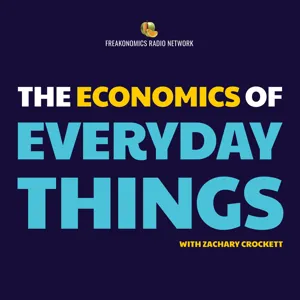Podcast Summary
Effective planning and preparation are crucial in managing weather-related risks: Understanding weather phenomena and integrating accurate forecasts into industries can help mitigate risks and make informed decisions.
Effective planning and preparation are crucial in managing risks associated with weather conditions, especially in industries that heavily rely on accurate weather forecasts. As highlighted in the discussion, even a well-organized event like Beyonce's renaissance world tour faced unexpected challenges due to extreme heat and dehydration risks during a hot August night. In contrast, the potential downside risks of leaving people exposed to lightning strikes during a storm are severe. This underscores the importance of meticulous planning and the integration of weather-related decisions into various industries, such as live events, aviation, retail, and agriculture. Young professionals, like Peter Neely, who have a deep interest in weather phenomena from a young age often end up pursuing careers in meteorology and weather forecasting. Predicting the weather involves a solid understanding of the fundamental principles of physics, including the behavior of hot air and the formation of raindrops. These skills are essential in providing accurate and timely weather forecasts, enabling industries and individuals to make informed decisions and mitigate potential risks.
Advancements in meteorology and technology revolutionized weather forecasting: Supercomputers and algorithms have enabled more precise weather forecasts since the 1940s, with trusted brands like The Weather Company using these technologies to serve millions monthly.
Advancements in meteorology and technology, specifically the use of supercomputers and algorithms, have significantly improved weather forecasting over the past century. Starting from the 19th century, meteorologists have relied on various observational tools to gather data about humidity, temperature, and barometric pressure. However, it wasn't until the advent of supercomputers in the 1940s that making accurate predictions became a feasible task. Since then, the models have incrementally improved, allowing for more precise forecasts. The Weather Company, which uses these technologies and data, has become a trusted brand and a major player in the industry, serving over 300 million people monthly and being acquired for over a billion dollars. Despite these advancements, even The Weather Company cannot account for every weather event, emphasizing the ongoing importance of continuous research and innovation in meteorology.
Limitations of weather forecasting and growing demand: Despite technological advancements, accurate weather forecasting remains a challenge. Demand is high due to reliance on weather in industries like agriculture, transportation, and aviation, resulting in a $2B+ market for forecasting services and $25B market for weather derivatives.
While we have made significant strides in weather forecasting with the help of advanced technologies and commercial enterprises, there are still limitations to our ability to know the exact weather conditions everywhere all the time. Despite this, the demand for accurate weather forecasting is higher than ever, with the global market for forecasting services valued at over $2 billion and a $25 billion market for weather derivatives on Wall Street. The increasing involvement of private companies in weather observation, including the launch of their own satellites, has led to a surge in data collection and improved forecasting accuracy. With over 30% of the US economy relying on the weather in some capacity, industries such as agriculture, transportation, and construction are heavily dependent on weather forecasting, particularly the aviation industry.
Using AI to Improve Weather Forecasting: AI algorithms can identify patterns and sometimes predict weather events before human meteorologists, improving weather forecasting accuracy for industries like aviation, agriculture, and energy.
Weather predictions have become increasingly valuable for industries like aviation, where even small inaccuracies can lead to significant delays and costs. Meteorologists use various methods to increase their confidence in forecasts, including measuring atmospheric stability. However, this can be challenging due to the chaotic nature of the atmosphere, which can cause small differences to lead to big outcomes. Artificial intelligence (AI) is a new tool that has been making headway in weather forecasting in recent years. AI algorithms can identify patterns that may be missed by human meteorologists and can sometimes even predict weather events before the underlying science is fully understood. For example, a study published late last year showed that an AI-powered weather prediction model built by Google outperformed decades-old government models. However, there is a new challenge facing weather forecasting: climate change. Climate change can make weather patterns more complex and unpredictable, making it harder for even advanced AI and supercomputers to accurately forecast the weather. Despite these challenges, the potential benefits of improved weather forecasting are significant, particularly for industries like aviation, agriculture, and energy.
Historical data less reliable for accurate weather forecasts: Climate change makes historical data less effective for weather forecasts, but advancements in technology have made predictions more accurate than ever, despite unpredictable extreme weather events
Historical data may not be reliable for making accurate weather forecasts in today's unstable climate. As climate change continues to impact the planet, historical data based on pre-climate change circumstances becomes less effective. Extreme weather events are becoming more frequent, intense, and unpredictable, making it harder for meteorologists to make accurate predictions. For instance, storms now form and intensify faster than before, and temporary structures may not be able to withstand the stronger winds. However, despite these challenges, weather forecasting has become more accurate than ever. It's essential to understand that while weather forecasts can provide valuable information, they don't offer 100% certainty. So, while you can generally trust that your weather app's prediction for an average day will be relatively accurate, be prepared for unexpected weather events. Ultimately, it's crucial to stay informed about weather conditions and be prepared for potential changes.

